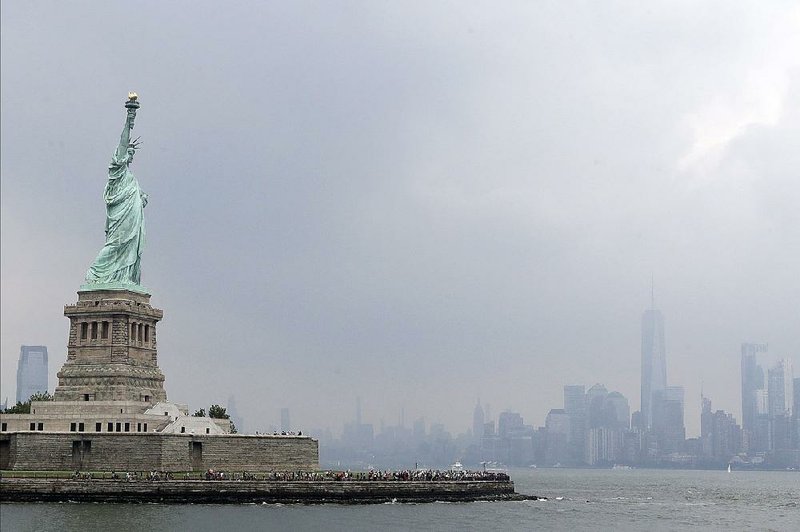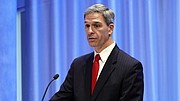WASHINGTON -- A top official in President Donald Trump's administration said the famous inscription on the Statue of Liberty, welcoming "huddled masses" of immigrants to American shores, was referring to "people coming from Europe" and that the nation is looking to receive migrants "who can stand on their own two feet."
The comments on Tuesday from Ken Cuccinelli, the acting director of U.S. Citizenship and Immigration Services, came a day after the Trump administration announced it would seek to deny green cards to migrants who seek Medicaid, food stamps, housing vouchers or other forms of public assistance. The move, and Cuccinelli's defense, prompted an outcry from Democrats and immigration advocates who said the policy would favor wealthier immigrants and disadvantage those from poorer countries in Latin America and Africa.
"This administration finally admitted what we've known all along: They think the Statue of Liberty only applies to white people," tweeted former Texas Rep. Beto O'Rourke, a Democratic presidential candidate.
Cuccinelli said in an interview with CNN on Tuesday night that the Emma Lazarus poem emblazoned on the pedestal of the Statue of Liberty referred to "people coming from Europe where they had class based societies where people were considered wretched if they weren't in the right class."
Lazarus' poem, written in 1883 to raise money to construct the Statue of Liberty's pedestal and cast in bronze beneath the monument in 1903, served as a beacon to millions of immigrants who crossed past as they first entered the U.S. in New York Harbor. It reads, "Give me your tired, your poor, Your huddled masses yearning to breathe free, The wretched refuse of your teeming shore."
Cuccinelli was asked earlier Tuesday on NPR whether the words "give me your tired, your poor" were part of the American ethos. Cuccinelli responded: "They certainly are. Give me your tired and your poor who can stand on their own two feet and who will not become a public charge."
Cuccinelli is one of a slew of immigration hardliners brought in by Trump to implement the president's policies. He was appointed to the post in June in a temporary capacity, which doesn't require Senate confirmation.
Trump, asked Tuesday about Cuccinelli's comments on NPR, appeared to back him up.
"I don't think it's fair to have the American taxpayer paying for people to come into the United States," Trump told reporters before boarding Air Force One for Pennsylvania. "I think we're doing it right."
Another Democratic presidential candidate, Massachusetts Sen. Elizabeth Warren, also condemned Cuccinelli's comments.
"Our values are etched in stone on the Statue of Liberty. They will not be replaced," she tweeted. "And I will fight for those values and for our immigrant communities."
Cuccinelli's comment also concerned immigration historians who saw his comments as a distortion of one of the nation's most symbolic ideals.
"Clearly, he did not take part in our curriculum," said Annie Polland, executive director of the American Jewish Historical Society, which is leading a three-year initiative called the Emma Lazarus Project.
"It really goes against the whole spirit of the poem," she said. "To just pull out a law and say that it is symbolic of America is a distortion of a much more complicated reality."
In his comments Tuesday, Cuccinelli repeatedly stressed that Lazarus wrote the poem one year after the first federal public charge law was passed.
"Very interesting timing," Cuccinelli had said.
The Immigration Act of 1882 denied entry to any "convict, lunatic, idiot, or any person unable to take care of himself or herself without becoming a public charge." The provision is rooted in colonial-era "poor laws," in which states like Massachusetts could deny entry to or deport poor or disabled people, as Hidetaka Hirota, author of Expelling the Poor, wrote in a Washington Post opinion piece this week.
In 1903 -- the same year Lazarus' poem was actually inscribed on the Statue of Liberty, Cuccinelli noted -- Congress expanded the rule to allow deportation of any foreigner who became a public charge within five years of coming to the United States. Public charge deportations were carried out only if the cause of a person's dependency on welfare originated before their arrival in the United States, such as if they had a serious disability or illness that officials had overlooked -- not because they fell on hard times.
"Cuccinelli is right," Erika Lee, a professor of immigration history at the University of Minnesota, wrote in a Twitter thread Tuesday. "The law has been on the books for a long time, and we have always targeted the poor. But that does not make it right."
Information for this article was contributed by Zeke Miller and Ashley Thomas of The Associated Press; and by Meagan Flynn of The Washington Post.
A Section on 08/15/2019


